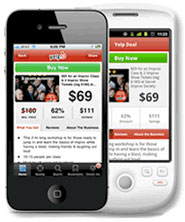 With Groupon clones lining the digital streets like “GIRLS GIRLS GIRLS” signs in the seedy parts of Reno, you’d think the model was an easy one to replicate.
With Groupon clones lining the digital streets like “GIRLS GIRLS GIRLS” signs in the seedy parts of Reno, you’d think the model was an easy one to replicate.
Facebook did it; Yelp did it; now Google is doing it. But when big names start pulling out, we have to ask: is this business harder than it looks?
There are a couple of ways to operate a deals site. First, you can offer deals you have worked out yourself. In simplest of terms, a company operating under this model directly contacts a targeted business, decides on the revenue share and pushes out that deal to its userbase. Groupon operates under this approach.
Second, you can aggregate deals from other deals sites and publish them on your own website. Facebook started its deals program out using this model; later, it switched to Groupon’s formula.
In theory, these deals are a mutualism: free marketing and new customers for a share of the profit. Daily deals have made companies like Groupon successful enough to file for an initial public offering.
But as with most transactions, there’s a hidden cost. Facebook felt it with the recent decision to drop out of the deals scene. Yelp took a step back on its deals program as well. Does Google Offers, the search behemoth’s own daily deals offering, stand a chance?
Greg Sterling, the founding principal of Sterling Market Intelligence, sees the challenges as two-fold: competition and business structure.
“Groupon and LivingSocial blazed the trail,” Sterling told VentureBeat in an interview. “And then all these clones would use as a sales tool lists of businesses that use Groupon deals.”
Then they call these businesses and then ask them to run a deal with them.”
In essence, the deals ecosystem is plagued with vultures. Smaller, competing daily deals sights scrape Groupon’s client list for poaching opportunities because these businesses have already shown interest in using the deals model. It eliminates the grunt work of finding those willing and able to support a deal.
And the competitor landscape isn’t getting any smaller. It feels like a new deals site, broad or niche-focused, appears every day. There are deals sites for moms, dogs, cats, gay people, green people, Jewish people and a slew of geo-specific communities. It’s enough to make you reminisce about those late nights waiting for your midnight Woot.
As for the structure of deals, as Yelp chief executive Jeremy Stoppelman said in a blog post on the subject, “It hasn’t been all rainbows and unicorns.” High revenue shares, such as Groupon’s 50/50, leave small businesses with a chunk of change missing while product flies out the door. So why agree to the deal in the first place?
The high influx of new customers should bring repeat customers, but not every business is experiencing new business with the increased exposure. A 2010 study of 150 merchants, performed by Jesse H. Jones Graduate School of Business at Rice University, showed that 32 percent of these Groupon clients were unsatisfied and unprofitable.
Lacking repeat business may be due to the fact that deal seekers are deal seekers. They may have never considered a water polo class or trendy restaurant if the deal wasn’t available.
So what of the big companies like Facebook, Yelp and Google that have opened (and closed) their own Groupon competiors?
Yelp
Yelp launched its deals program last year and announced in a blog post yesterday that it is cutting its deals staff in half from 30 to 15.
“Over the course of the last year, we have tested several iterations of the daily deal,” said a Yelp spokesperson in an email to VentureBeat. “[We] have recognized that small businesses want to participate in sustainable marketing campaigns that give them exposure to new consumers who will likely become loyal or repeat customers. Yelp Deals is one offering in our portfolio of ad products that we present to small businesses; it is not our core product.”
Perhaps herein lies the problem. Finding businesses, copy writing offers, fielding customer service inquiries, managing revenue share and more all add up. Running a deals site is a business in and of itself. According to the same blog by Stoppelman, Yelp cut its deals division in half because the employees were focusing on both deals and local ads. This may have been an effort to streamline and cut distractions.
Facebook started their deals program in April 2011, only to shut its doors five months later.
The social network told VentureBeat in a n e-mail last week, “After testing Deals for four months, we’ve decided to end our Deals product in the coming weeks. We think there is a lot of power in a social approach to driving people into local businesses. We’ve learned a lot from our test and we’ll continue to evaluate how to best serve local businesses.” But deals just wasn’t able to make the cut.
n e-mail last week, “After testing Deals for four months, we’ve decided to end our Deals product in the coming weeks. We think there is a lot of power in a social approach to driving people into local businesses. We’ve learned a lot from our test and we’ll continue to evaluate how to best serve local businesses.” But deals just wasn’t able to make the cut.
Sterling , like most, didn’t see the sudden departure coming.
“I was surprised, frankly, that Facebook pulled back and Yelp after that,” he said, referencing Yelp’s recent announcement to cut its deals team in half. “Because the minute Groupon showed up on the scene I thought, ‘This is exactly what Facebook could do… and [do it] more successfully.'”
Facebook had the audience and marketing capabilities to take some market share away from Groupon, but it pulled back.
“It was almost as thought they had some initial data from the market and then they [started the program], looked around and decided, ‘This isn’t for us,'” said Sterling.
Google
Google Offers went live in June and is still in a beta testing phase, only available in Portland, the San Francisco Bay Area and New York City. Despite its competitors backing down, the company seems to be pushing on.
“This beta is just the beginning,” a Google spokesperson told VentureBeat.
On Wednesday, Google showcased one of its deals on its front page, spurring talks that the search company may be trying to take on Groupon, the company Google tried to acquire for $6 billion in 2010.
According to Sterling, Google needs to really focus in order to survive up against a mushrooming competitor landscape and challenges of the business itself.
“I think that Google, if it got the resolve, could be one of the leading players in the space. It’s a question of how much commitment they’re going to make,” he said. “There’s a question around their commitment to building a sales force to scale.”
Google may already have a leg up, however. “Google may be taking less of a margin than competitors and subsidizing like they did early on with AdSense.” Sterling did specify this was a rumor.
“This is a very competitive market,” the Google spokesperson added, “For businesses, an important distinction from other local deals providers is that the revenue from pre-paid Google Offers comes to them within a week. We deliver 80 percent of the revenue from running a Google Offer to the business within 4 days and the remaining 20 percent less refunds within 90 days.”
Still viable or dead on arrival ?
According to Larry Handen, investor in European deals site Groupalia and managing director at Insight Venture Partners, there is a certain discipline needed to make a deals site succeed. Speaking of Groupalia’s senior leadership, he told VentureBeat, “They’re thinking in terms of quarters and years, but they are acting in terms of campaigns and hours and days. In this market, that’s exactly what you need.”
What he is saying is simple. You need a broad outlook, with the dedication to handle day-to-day challenges to succeed. With distractions surrounding big companies like Yelp, Facebook and Google, it may be hard to stay focused. Keeping a trained eye, however, could lead to the deals win.
“It’s a bit overwhelming,” Sterling said, “But it can work very well for certain kinds of businesses.”
[First image via Gunnar Pippel/Shutterstock]

